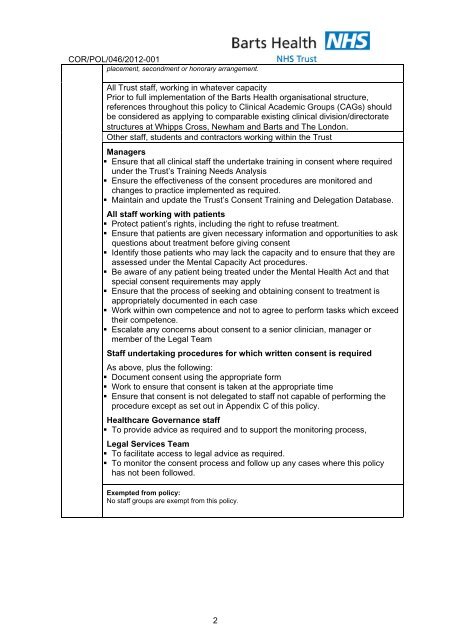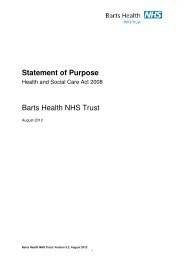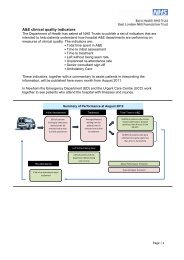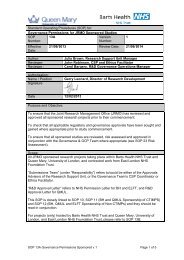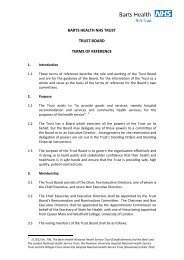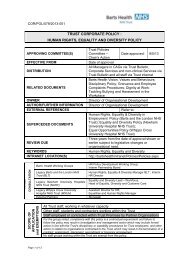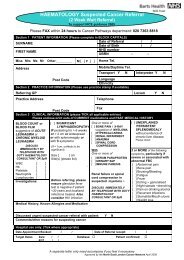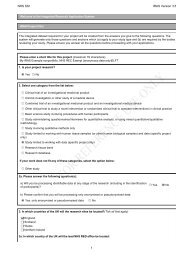Consent to examination and treatment - Barts Health NHS Trust
Consent to examination and treatment - Barts Health NHS Trust
Consent to examination and treatment - Barts Health NHS Trust
Create successful ePaper yourself
Turn your PDF publications into a flip-book with our unique Google optimized e-Paper software.
COR/POL/046/2012-001<br />
placement, secondment or honorary arrangement.<br />
All <strong>Trust</strong> staff, working in whatever capacity<br />
Prior <strong>to</strong> full implementation of the <strong>Barts</strong> <strong>Health</strong> organisational structure,<br />
references throughout this policy <strong>to</strong> Clinical Academic Groups (CAGs) should<br />
be considered as applying <strong>to</strong> comparable existing clinical division/direc<strong>to</strong>rate<br />
structures at Whipps Cross, Newham <strong>and</strong> <strong>Barts</strong> <strong>and</strong> The London.<br />
Other staff, students <strong>and</strong> contrac<strong>to</strong>rs working within the <strong>Trust</strong><br />
Managers<br />
• Ensure that all clinical staff the undertake training in consent where required<br />
under the <strong>Trust</strong>’s Training Needs Analysis<br />
• Ensure the effectiveness of the consent procedures are moni<strong>to</strong>red <strong>and</strong><br />
changes <strong>to</strong> practice implemented as required.<br />
• Maintain <strong>and</strong> update the <strong>Trust</strong>’s <strong>Consent</strong> Training <strong>and</strong> Delegation Database.<br />
All staff working with patients<br />
• Protect patient’s rights, including the right <strong>to</strong> refuse <strong>treatment</strong>.<br />
• Ensure that patients are given necessary information <strong>and</strong> opportunities <strong>to</strong> ask<br />
questions about <strong>treatment</strong> before giving consent<br />
• Identify those patients who may lack the capacity <strong>and</strong> <strong>to</strong> ensure that they are<br />
assessed under the Mental Capacity Act procedures.<br />
• Be aware of any patient being treated under the Mental <strong>Health</strong> Act <strong>and</strong> that<br />
special consent requirements may apply<br />
• Ensure that the process of seeking <strong>and</strong> obtaining consent <strong>to</strong> <strong>treatment</strong> is<br />
appropriately documented in each case<br />
• Work within own competence <strong>and</strong> not <strong>to</strong> agree <strong>to</strong> perform tasks which exceed<br />
their competence.<br />
• Escalate any concerns about consent <strong>to</strong> a senior clinician, manager or<br />
member of the Legal Team<br />
Staff undertaking procedures for which written consent is required<br />
As above, plus the following:<br />
• Document consent using the appropriate form<br />
• Work <strong>to</strong> ensure that consent is taken at the appropriate time<br />
• Ensure that consent is not delegated <strong>to</strong> staff not capable of performing the<br />
procedure except as set out in Appendix C of this policy.<br />
<strong>Health</strong>care Governance staff<br />
• To provide advice as required <strong>and</strong> <strong>to</strong> support the moni<strong>to</strong>ring process,<br />
Legal Services Team<br />
• To facilitate access <strong>to</strong> legal advice as required.<br />
• To moni<strong>to</strong>r the consent process <strong>and</strong> follow up any cases where this policy<br />
has not been followed.<br />
Exempted from policy:<br />
No staff groups are exempt from this policy.<br />
2


